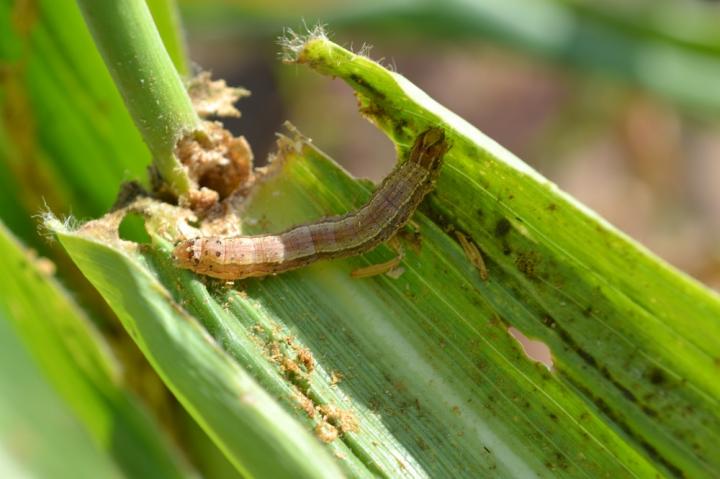CABI has led the first study to explore the income and food security effects of the fall armyworm invasion on a country — revealing that in Zimbabwe smallholder maize-growing households blighted by the pest are 12% more likely to experience hunger

Credit: CABI
CABI has led the first study to explore the income and food security effects of the fall armyworm invasion on a country – revealing that in Zimbabwe smallholder maize-growing households blighted by the pest are 12% more likely to experience hunger.
Dr Justice Tambo, lead researcher of the study published in Food and Energy Security, sought to investigate the impact of the fall armyworm (Spodoptera frugiperda) on household income and food security as well as the extent to which a control strategy can help mitigate the negative impacts of the pest.
He, along with CABI colleagues from its centres in Kenya and Zambia as well as in collaboration with Zimbabwe’s Ministry of Lands, Agriculture, Water and Rural Settlement, also found that severe level of infestation reduced per capita household income by 44% and increased a household’s likelihood of experiencing hunger by 17%.
Indeed, the research – which looked at survey data obtained from 350 smallholder maize-growing households in six provinces across Zimbabwe – showed that households affected by fall armyworm were 11% more likely to experience food shortage, and their members had a 13% higher probability of going to bed hungry or going a whole day without eating because of household food insufficiency.
The scientists also discovered that the fall armyworm-affected households who failed to implement a control strategy had a 50% lower per capita household income, while their counterparts that implemented a control strategy did not suffer a significant income loss. Around 30% of 185 households who reported fall armyworm infestation in their farms did not implement any intervention.
Those who did manage to control the pest typically used synthetic pesticides and handpicking of egg masses and larvae. Other methods included pouring ash or sand into maize whorls, rogueing and burning of infested plants, and the application of detergents.
Fall armyworm was reported for the first time in Zimbabwe during the 2016/2017 cropping season and has continued to spread and cause damage to crops in the following seasons.
Rwomushana et al. (2018) argues that the pest has the potential to cause an annual reduction in maize production in Zimbabwe of about 264,000 tonnes, translating into revenue loss of US$ 83 million.
Dr Tambo, who is based at CABI’s Swiss Centre in Delémont, said, “Our results suggest that while fall armyworm cannot be eradicated, taking actions to at least prevent severe level of infestation can significantly reduce welfare losses in terms of income and food security.
“Further studies are, however, needed to determine the threshold level of infestation that does not lead to significant welfare losses, as the present study applied a simple binary disaggregation of fall armyworm infestation into minor and severe infestation based on farmers’ self-reported information.
“More importantly, it would be useful to investigate which of the control measures can achieve the most positive outcomes that are cost-effective, safe and environmentally sustainable.”
###
Additional information
Full paper reference
Justice A. Tambo, Monica K. Kansiime, Ivan Rwomushana, Idah Mugambi, Winnie Nunda, Catherine Mloza Banda, Shingirayi Nyamutukwa, Fernadis Makale, Roger Day, ‘Impact of fall armyworm invasion on household income and food security in Zimbabwe’, 15 March 2021, Food and Energy Security, DOI: 10.1002/fes3.281
This paper can be viewed open access here: https:/
Media Contact
Wayne Coles
[email protected]
Related Journal Article
http://dx.




